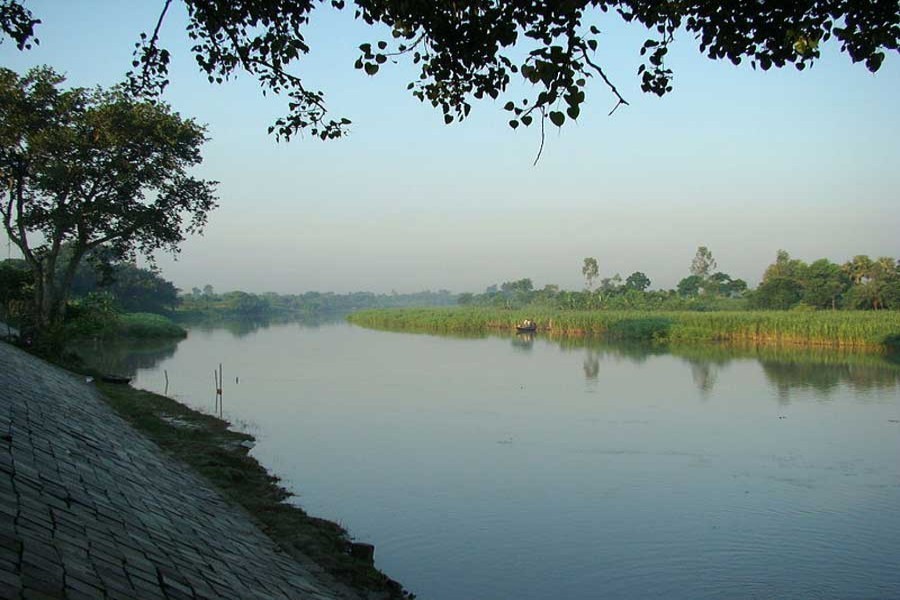The people of this land take immense pride in the fact that theirs is a riverine country. Rivers flowing from the Himalayan ranges have shaped its deltaic character and the mighty among them once evoked a mixed feeling of fear and irresistible passion in the people, particularly those living on fishing and working on board steamers and ships. No wonder, the love-hate relations with rivers, social prejudice, ethnic beliefs, conflicts, despairs and hopes and the overall social dynamics have inspired great writers to produce classics like Padma Nadir Majhi, Kado Nadi Kado, Titas Ekti Nadir Nam, Sareng Bou etc.
Today not only have scores of rivers dried up leaving no trace of them but also the mighty are struggling for their existence. Some of the consequences are definitely from the climate change but human contribution is no less pronounced. After all climate change itself has mostly been influenced by human actions. True, in the monsoon some of the mightiest and also a few modest rivers still wreak havoc with human settlements on their banks as they devour village after village or trade centres or even semi-urban localities.
However, in the lean season, the rivers lose their steam and cut a very low profile -so low that land-grabbers and encroachers illegally occupy as much of shorelines as they can. Unfortunately, no Manik Bandopsadhya, no Syed Walliullah, no Adwaita Mallabardhan or no Shahidullah Kaiser live today to take up the sad saga of rivers and present before the nation the villainy of men in it.
One silver lining, though, amid the deepening gloom is the High Court's declaration of rivers as living entity in July last year. A few rights groups have also been campaigning for protection of rivers with especial focus on the four rivers girdling capital Dhaka and precariously hanging to their breathing space. More and more people are now convinced that unless the rivers survive the capital city will have to be abandoned at some point. If the focus is spread all around, even the country's existence is largely dependent on the survival of its rivers.
Human civilisation has flourished on the banks of rivers since time immemorial. Maltreatment of rivers exacts a heavy price on the perpetrators. The inhabitants and the authorities of Dhaka City are no exception. Although late, the realisation that the rivers Buriganga, Balu, Turag and Sitalakhya must be saved in order to save the city, Narayanganj and the localities surrounding them seems to have started bearing fruits. The Bangshi is another candidate for similar treatment against encroachers. The eviction drive by the Bangladesh Inland Water Transport Authority (BIWTA) against encroachers on the banks of these rivers following the milestone HC declaration was to a large extent of a sustained nature and it has its positive impact on the rivers, particularly the Buriganga and Turag.
To the delight and rejoicing of all who love Nature and campaign for protection of rivers, the Buriganga has regained much of its health right at this moment. Sure enough, this monsoon the cause has been further helped by the pressure from flood waters in the country's north. The onrushing waters have started crossing the central region of the country and naturally the rivers around the capital have also got a share of the excess waters.
The jet black tar-like stinking waters of the Buriganga have been replaced by a more or less translucent kind that sprightly dance with moderate winds now blowing from the south-west. Still more rejoicing is the fact that the river which--- polluted beyond all measures --- did not allow survival of any living organism in its waters, has become a venue for fishing. From small fish such as puti, tengra to rui, katla, kalbaus have now become regular catches of fishermen -both amateur and professional. What a pleasant surprise!
When a river becomes so endearing, it takes no time to be a rendezvous of pleasure boat rides for people bored to the extreme from prolonged lockdown. And this has in turn given a new lease of life to boatmen whose life is inseparable from rivers. Their service at Bosila point not far from Mohammadpur bus stand is now in great demand. The sprightly waves created by winds go into making an enchanting environment together with the bushes of cash grass (saccharum spontaneum) on the shores, picturesque villages at a distance and the beelines of flocks of birds further amplified by the crimson hues of the setting sun.
No doubt, removal of the tanneries from Hazaribagh has been the prime reason behind improving the river's health. But the long absence of release of effluent from both factories and water vessels during corona lockdown can be considered contributory factors. As the Department of Environment's quality test of water at the Mirpur Bridge point of the Buriganga finds, dissolved oxygen in water was zero per cent last year, in April this year the percentage has increased to 2.02 miligram. Now this should record further improvement. This is a lesson for all concerned. Many of the European great cities are bifurcated by rivers, the management of which should be studied closely in order to restore the health of the Buriganga and other rivers round the year.


